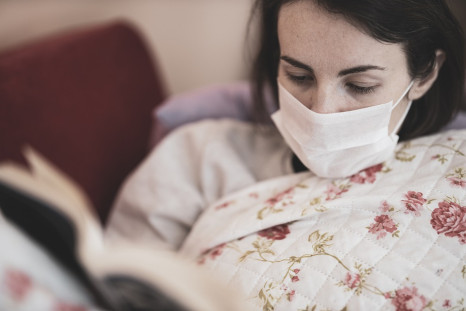Use of strong sleeping pills on dementia patients puts them at higher risk of fractures
Patients who have been using Z-drugs in higher doses must not stop taking it abruptly but they should seek advice from their physicians first.
Nov 27, 2020
Diabetic heart health may benefit more from frequent, short exercises than longer workouts
The quick bursts of exercise among patients suffering from type 2 diabetes may help in reducing the risk of heart disease.
Nov 27, 2020
Restricting gadget use in adolescents has little impact in adulthood, study claims
Participants were interviewed about their current technology use, how they used it during teenage years and if their parents restricted their usage.
Nov 27, 2020
Zombie minks infected with mutated coronavirus rise from graves after culling
Danish officials are now planning to bury culled minks in deeper graves but the public is calling for cremation.
Nov 26, 2020
Coronavirus woes: Hearing problems become more obvious when people wear masks
The coping mechanism of those with hearing impairments, which is to stand close to a person, has been eliminated because of physical distancing.
Nov 26, 2020
Popular weight loss surgery may lead to weakened bones in teens
The sleeve gastrectomy procedure involves removing approximately 75 percent of the stomach in order to restrict the intake of food.
Nov 26, 2020
Cooking with wood may lead to damaged lungs
Those who cook using wood are exposed to more pollutants as compared to liquefied petroleum gas users.
Nov 26, 2020
Burn victims may find hope in new 'electronic skin' that can feel
The goal of researchers is to help restore the sense of touch to patients who have lost it either through accidents like getting burned or because of illness.
Nov 25, 2020
Your teeth can reveal whether you are a 'superspreader' or not
Two notable features of superspreaders include having a full set of teeth or having a stopped-up nose.
Nov 25, 2020
Sinful but good for the brain: Chocolates rich in cocoa flavanols boost cognition in healthy adults
Participants were given cognitive tests after ingesting cocoa flavanols, and their rate of solving problems increased by 11 percent.
Nov 25, 2020
COVID-19: Questions raised as CDC considers bringing quarantine down to just 1 week
As new data emerges about the virus, the CDC announces changes to protocol as it deems appropriate.
Nov 25, 2020
Why men are more likely to receive CPR from bystanders than women
There is a reluctance to help when it comes to women who need CPR as people are worried that they might end up being accused of sexual assault.
Nov 24, 2020
Fans of a vegan diet are at a higher risk for bone fracture, study says
Pescatarians, or those who eat only fish but not meat, are also facing a higher risk.
Nov 24, 2020
Doctors reveal link between COVID-19, seizures and epilepsy
Doctors emphasised that patients must be mindful of increased stress levels and shortage in medication, as it could give rise to an epileptic seizure.
Nov 24, 2020
Warning: Your vacuum cleaner can be remotely hacked to record conversations
Even if the devices that have Lidar do not have microphones, they could still be remotely manipulated to pick up audio.
Nov 24, 2020
Breakthrough anti-ageing oxygen treatment makes patients 'grow younger'
The treatment lengthened the telomeres and shortened another type of cell, the senescent, which contribute to the reversal of the ageing process.
Nov 23, 2020
With bee species rapidly dying off, scientists create first global map to save them
Researchers combined data from more than 5.8 million records on public bee occurrences, with a checklist of the distribution of more than 20,000 bee species.
Nov 23, 2020
How to reduce coronavirus risk: Scientists weigh in on best way to prevent COVID-19 infection
Using the model "event R," scientists found that physical distancing is still the universally effective way of reducing the spread of COVID-19.
Nov 23, 2020
Vitamin D supplements may lower cancer risk by more than a third, study says
The protective effect was only apparent for those who have normal BMIs who were reportedly able to cut the risk by 38 percent.
Nov 23, 2020
How are you feeling? Smartphone sensors that analyse mobility behaviour can hold the answer
Researchers measured various kinds of mobility behaviour such as total distance covered, number of locations visited, and also time spent in transit.
Nov 20, 2020
Excessive consumption of eggs linked to increased risk of diabetes
The results were more profound in women as compared to men.
Nov 20, 2020
Costly yet ineffective? CDC says COVID-19 airport screening hardly detects asymptomatic carriers
Passenger-entry screening at airports are resource-intensive yet have a low yield of laboratory-diagnosed cases of coronavirus.
Nov 20, 2020
Stop clicking! Too much smartphone use can make you more impulsive, study says
Those who spend more time on their smartphones have a higher tendency to reject larger or delayed rewards in favor of immediate rewards.
Nov 20, 2020
Packing on calories early in the day does not affect weight loss, study reveals
For a long time, researchers have wondered whether eating during the day affects the manner by which the body would use and store energy.
Nov 19, 2020
Twinkling lights and colourful holiday decors do wonders for mental health
When new things are introduced to one's environment, like light, sound, or colour, the senses tend to get stimulated, which can make people feel good.
Nov 19, 2020
FDA authorises Covid-19 self-testing kits at home that gives results in 30 minutes
This kit is one of the firsts that could be fully self-administered at home, with results provided without necessitating sending the results to the lab.
Nov 19, 2020
Healthy sleep patterns associated with reduced heart failure risk
Some of the factors that were analysed include the length of sleep, snoring, and insomnia, and whether the participants were early risers or night owls.
Nov 18, 2020
Mouthwash could kill coronavirus in matter of 30 seconds, new study indicates
The researchers conducted the tests at the university laboratory, mimicking the conditions of an individual's oropharynx passage.
Nov 18, 2020
Dog ticks may prefer to live on humans than dogs whenever temperatures rise
When temperatures would rise from 74 to 100 degrees Fahrenheit, brown dog ticks that carry the disease have a higher chance of preferring humans over dogs.
Nov 18, 2020
Study finds cheap daily combo pill that promises to lower heart risk
The pill contains three blood pressure medicines, which include ramipril, atenolol, and hydrochlorothiazide, and statin, a cholesterol-lowering medicine.
Nov 16, 2020
Pages
- PREV
- 5
- 6
- 7
- 8
- 9
- 10
- 11
- 12
- 13
- NEXT



































